Swarthmore Faculty Earn Numerous Grants and Awards During Fall Semester

Over the fall 2021 semester, Swarthmore faculty members across several disciplines — including, but not limited to, biochemistry, mathematics & statistics, astronomy, and linguistics — were recognized with grants and awards from a distinguished group of organizations.
Dedicated to offering a robust liberal arts curriculum connecting the humanities, natural sciences and engineering, social sciences, and interdisciplinary programs, Swarthmore’s faculty — with their commitment to collaborating with students in research — are the best reflection of that mission.
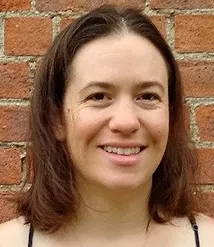
Bauer’s project Stronger Together: Exploring How Communal Care Reduces Individual Costs During Challenging Years has been recognized with funding from the National Science Foundation’s International Research Experiences for Students program.
In collaboration with researchers at the University of Tennessee at Chattanooga, this field study will examine how ecology shapes the reproductive consequences of communal breeding, a social strategy in which multiple mothers nurse offspring communally. The grant supports 5–6 undergraduate and graduate students per year to study how challenging environmental conditions influence physiological development of communally breeding Octodon degus, a social rodent endemic to Chile.
“I’m very excited to offer students an international field-research opportunity so we can work with my favorite animal: the degu,” says Bauer. “Degus (Octodon degus) are social rodents native to central Chile, and are very amenable to long-term studies. Our research will examine how early life conditions can influence the development of endocrine, metabolic, and ion/water balance physiology in degu offspring. As central Chile is projected to become more arid over time, our findings will shed light on how these animals may respond to climate change.”
Collaborating institutions also include four academic institutions in Chile (P. Universidad Católica de Chile, Universidad de Chile, Universidad Andres Bello, and Universidad Mayor).
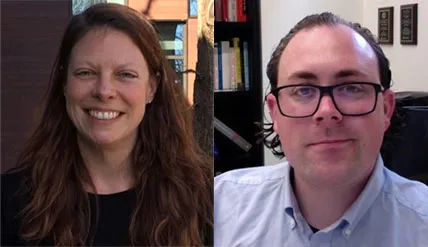
Cat Norris and John Blanchar received a grant from the Pennsylvania Department of Health.
Assistant Professor of Psychology John Blanchar and Associate Professor of Psychology Cat Norris
The Pennsylvania Department of Health awarded Blanchar and Norris a grant for their project Compliance With and Responses to COVID-19 and Its Vaccine: Moderating Effects of Political Beliefs, Individual Differences, and Social Influences, and Impact on Mental Health and Psychological Well-Being.
The project will examine how factors such as political beliefs and partisanship, social networks, news-media consumption, and personality traits impact people’s thoughts and feelings about COVID-19 and their willingness to get vaccinated, as well as the effects of these factors on mental health and psychological well-being. Norris and Blanchar previously collected data about these issues as part of their longitudinal study on the 2020 U.S. presidential election called the Swarthmore College American Political Election Survey. That research will inform this project and offer a unique perspective on assessing how feelings, attitudes, and behaviors have changed over time, and how these changes may impact both physical and psychological well-being.
“We are excited to extend and expand this project, and for the many opportunities it will provide our students to get involved in impactful psychological research,” says Blanchar. “Through this research, we can test ideas about when and how the politicization of public health-related issues occurs, its consequences for people’s physical and mental health, and how social and behavioral scientists might begin to address this growing problem.”
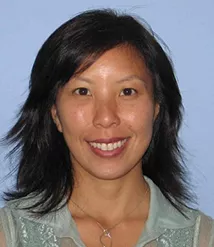
The National Science Foundation (NSF) awarded Chen with a grant to fund her research project Combinatorial Algebraic Geometry: Curves and Their Moduli. Her research program consists of problems that arise from the fruitful interactions between algebraic geometry and new developments in other fields of mathematics such as combinatorics, which is concerned with organizing and analyzing discrete structures. This project will include research with undergraduate students and will continue efforts toward broadening participation of members of underrepresented groups in the mathematical sciences.
“Something I find very beautiful about mathematics is how deeply intertwined various fields are, and how these connections give new perspectives and insights,” says Chen. “In this project, I use ideas and tools from algebra and combinatorics in order to study problems in geometry."
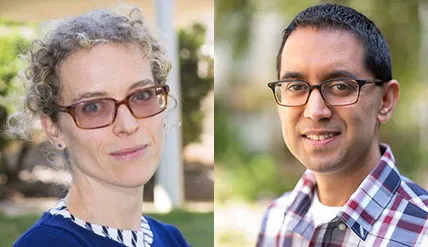
Eva-Maria Collins and Ameet Soni were awarded a grant by the Pittsburgh Foundation.
Associate Professor of Biology Eva-Maria Collins
The NSF has provided Collins with a grant for her project Investigating Non-linear Tissue Deformations Using Hydra Mouth Opening as a Quantitative In Vivo Model.
Epithelial tissues are found throughout the body and exercise a variety of critical functions, including withstanding extreme deformations: bending, stretching, and compression. This project creates an interdisciplinary research and education program aimed at characterizing the causes and effects of extreme deformations in epithelial tissues in the freshwater polyp hydra. Collins will study hydra mouth opening, a physiologically important process that relies exclusively on tissue deformation wherein epithelial cells experience azimuthal strains up to 200% within tens of seconds.
Collins will design a three-week mouth-opening laboratory module for her Systems Biology course, as well as a hands-on exercise on hydra behavior for the Science for Kids program at Swarthmore, which serves children from the neighboring town of Chester.
"This research funding offers exciting opportunities for students to engage with the biophysical mechanisms governing cell shape and function, and to elucidate general principles that underlie extreme tissue deformations," Collins says. "In collaboration with students, I look forward to developing hands-on learning experiences related to this research for the Science for Kids program and share our love for science."
Collins and Associate Professor of Computer Science Ameet Soni have also been awarded a grant by the Charles E. Kaufman Foundation of The Pittsburgh Foundation for their study Inferring Brain Function via Quantitative Behavioral Phenotyping in Free-Moving Planarian.
This project will explore behavior as a means to better understand how the brain works by connecting behavior to brain function using an unbiased quantitative characterization of the free behaviors of the asexual freshwater planarian (collective name for a type of flatworm) Dugesia japonica, which has the same neuronal genes and neurotransmitters as humans.
“We are excited about this opportunity to develop computational approaches to characterize planarian behavior to uncover basic principles on how the brain controls behavior,” says Soni. “This grant will provide students with an interdisciplinary research experience, allowing them to apply cutting-edge approaches in machine learning and molecular biology to study how the brain works.”
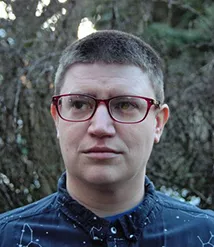
Conrod has been awarded the inaugural Arnold Zwicky Award by the Linguistics Society of America (LSA). The award is named for Arnold Zwicky, the first openly LGBTQ+ president of the LSA, and seeks to recognize contributions of LGBTQ+ linguistic scholars.
Of Conrod, the nominating committee cites “their contributions to linguistic research and pedagogy on the changing use of pronouns; for fostering inclusivity and belongingness within and beyond the LSA for people whose pronouns have changed or are novel; and for their far-reaching public educational efforts about gender diversity, pronouns, and inclusive LGBTQ+ language practices.”
“This award is especially meaningful to me because it shows recognition of the value of broader work alongside traditional scholarly publications,” says Conrod. “It is both moving and powerful to know that our field can honor writing that’s for wider audiences, and that we can connect efforts in diversifying science directly to efforts to share our science with more people outside the ivory tower.”

With a grant from the Pennsylvania Department of Health’s Commonwealth Universal Research Enhancement program, Gauthier aims to understand how the brain supports cognition, in particular learning and memory, with his project Tracking Long Term Memories in the Hippocampus.
To study the mechanisms of these processes, Gauthier employs a mouse model system that allows for rich measurements of neural activity. The project will develop a method for studying activity on longer time scales than was previously possible. “By developing analysis tools for long-term imaging, we will be able to track how memories form, consolidate, and are updated at the resolution of single neurons,” says Gauthier.
The work will focus exclusively on questions of basic science, but its findings could eventually lead to better understanding of human diseases that affect memory, such as Alzheimer’s, or suggest new algorithms for artificial intelligence.

The Transiting Exoplanet Survey Satellite (TESS) is a current NASA mission that identifies stars that appear to be periodically dimmed by orbiting planets. The NASA/TESS Guest Investigator Program is supporting a collaboration between Jensen and Karen Collins at the Smithsonian Astrophysical Observatory as part of a worldwide network of astronomers observing the candidate planet-host stars to carry out and coordinate these follow-up observations. Jensen maintains a web interface at Swarthmore used by observers to schedule observations and maintains software for scheduling observations on a network of automated telescopes.
“Working with NASA’s Transiting Exoplanet Survey Satellite mission has given me a chance to be deeply involved in the work of exoplanet discovery, as we try to understand how common other solar systems are, and how they compare to our own,” says Jensen. “I wrote a web interface that helps ground-based observers around the world schedule their follow-up observations of planet candidates from TESS, and every morning I wake up to a pile of messages about their latest observations as we work together to confirm and characterize these planets. Planets in my inbox! I’m so lucky to get to work in this field at such an exciting time.”

Using a “queer, intersectional, and abolitionist” lens, Mayorga’s Cultivating Connections Together (CCT) is a historical ethnographic study of the changing Philadelphia education landscape and a community-driven examination of the goals and practices of current partnership models. CCT seeks to bring attention to the vital role Black politics plays in defining the relationships between communities and schools historically and today.
The documentation and examination of partnership models in operation today will strengthen the educational experience for students and families by providing vital insight on what the underlying goals are of partnerships and what practices are effective in meeting those goals. Findings will be disseminated through multiple platforms, including the publication of a “Community Report” for the general public, a number of potential peer-reviewed journal publications, and collaboratively authored online writing to release findings.
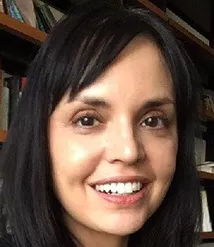
Nadkarni received an honorable mention for the 2021 Heldt Prize for best book by a woman-identifying scholar in any area of Slavic, East European, and Eurasian Studies from the Association for Women in Slavic Studies. The association described her book Remains of Socialism: Memory and the Futures of the Past in Postsocialist Hungary as “multi-layered, intimate, and insightful on many levels, this remarkable and beautifully written book sets a new standard in the field of memory studies. …
“Nadkarni’s nuanced and compelling theorizing on the concepts of nostalgia, material culture, and lived socialism draws on a long trajectory of research which includes interviews with Hungarians dating back to the early 1990s to explore complex fluctuations in their attitudes towards the recent past.”
“How did a country once expected to lead its neighbors in economic prosperity and liberal democratization after the end of state socialism instead become an emblem of the current right-wing illiberal turn in Europe?” says Nadkarni. “My book goes behind recent headlines to examine how, over more than two decades, Hungarians used their ambivalent memories of the socialist past to make sense of the disappointments of postsocialist transition. It shows how battles over painful pasts also represent struggles to master the present and determine the future — as well as to mourn the bright futures that fail to materialize.”
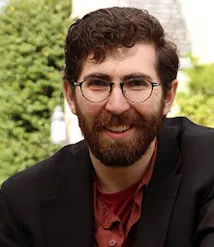
Language Learning has recognized Zinszer with a grant for his project Does Non-linguistic Segmentation Still Predict Literacy in an L2 Education? Statistical Learning in Ivorian Primary Schools.
Statistical learning (SL) is a mechanism that does not directly depend on participants’ knowledge of a language, but appears to predict language and literacy outcomes for children and adults. However, research linking SL and literacy has not addressed children who first learn to read in a second-language acquisition context, which is a common educational context in primary schools worldwide.
Considering several studies that link visual and auditory SL with childhood literacy in Australia, China, Europe, and the U.S., Zinszer proposes an adaptation of non-linguistic visual and auditory SL experiments in the West African nation of Ivory Coast, where students are educated in French and speak a local language at home.
“We have a lot to gain from seeking a broader perspective on children’s different educational experiences,” says Zinszer. The students in rural Ivorian schools learn in a context very different from the wealthy, industrialized communities that are most often studied. This grant from Language Learning has helped us update our research tools to better understand literacy in Ivorian primary schools and test how generalizable statistical learning skills are for children learning to read at different ages and with different language backgrounds.”



